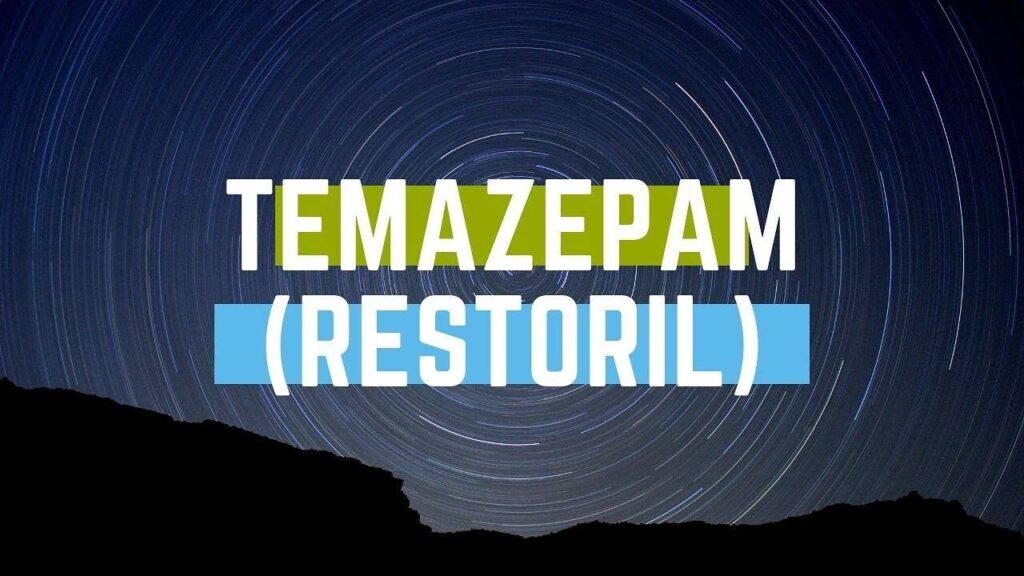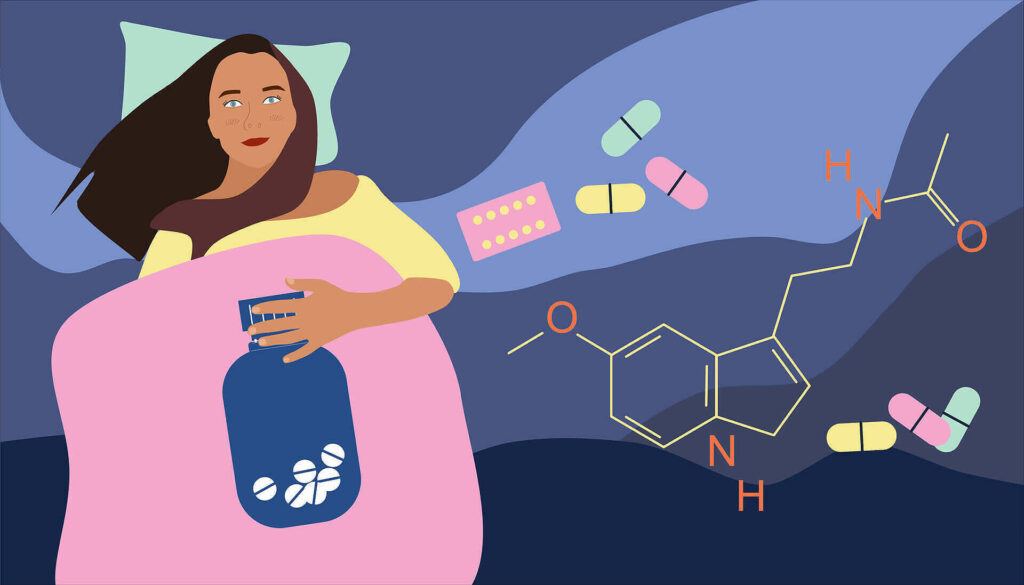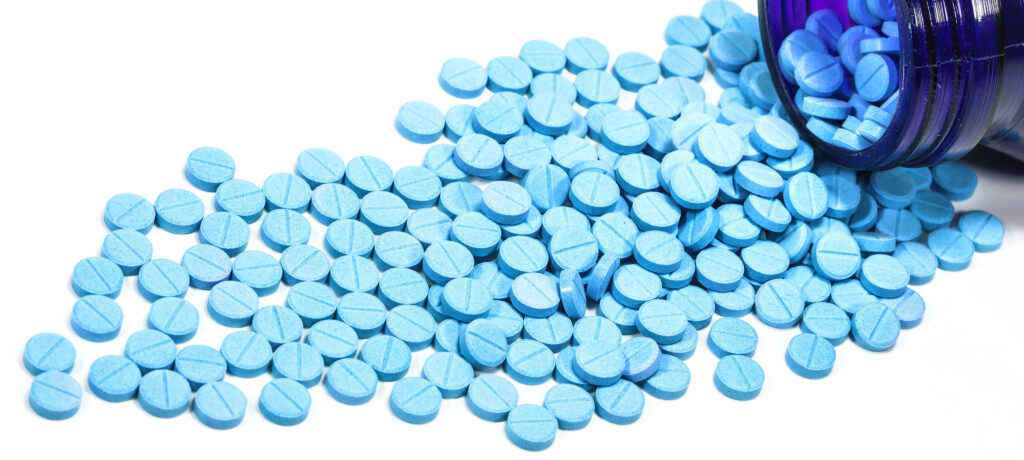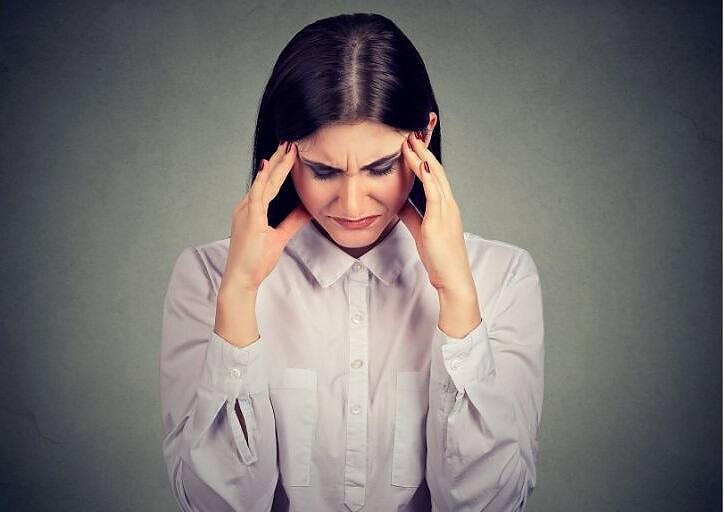As Mogadon addiction can occur quite quickly, it is crucial that you are conscious of the signs so that you can take action immediately. Its active ingredient is commonly prescribed in the UK for the relief of disabling insomnia and anxiety, on a short term basis. It enables you to fall asleep quicker and for longer without disruption. Increased medical use and availability on the street is driving an increase in Mogadon addiction in the UK.
Mogadon is a common brand name for the prescription drug Nitrazepam and at a high dose is extremely potent. This can be especially dangerous for someone who has little or no tolerance to benzodiazepines.
This strong benzodiazepine is often sought after by drug abusers. They may also use Mogadon to aid sleep after using a stimulant drug such as Crack, Speed or Crystal Methamphetamine.
When abused, Mogadon has a high mortality rate. Overdose usually occurs it is mixed with other Central Nervous System (CNS) depressant drugs.
CNS drugs include:
- Alcohol
- Barbiturates
- Opioids (illicit and prescribed)
- Some antidepressant medications
- Benzodiazepines
- Sedative hypnotics
- Z list drugs such as Zolpidem and Zopiclone
- Gabapentinoids such as Pregabalin and Gabapentin
Here we look at the risks, dangers and signs of Mogadon abuse. Further on, we advise of treatment options for Mogadon addiction. We also provide guidance on how you can help a loved one if you suspect they have a problem
What is Mogadon?
Other brand names for Mogadon include:
Alodorm, Arem, Apodorm, Epam, Ormodon, Nitrados, Nitrazadon, Nitravet, Paxidorm and Somnite.
Mogadon is a benzodiazepine and a sedative hypnotic drug. It is used to treat severe and disabling anxiety or insomnia.
Due to its muscle relaxant effects and ability to calm brain overactivity, Mogadon is also sometimes used as an anticonvulsant. It can be prescribed off label to treat certain types of epilepsy.
Mogadon comes in varying dosages and is prescribed in tablet form.
Dosage indications for healthy adults over 18 years of age are: 5 to 10 mg once a day to be taken at night before bed
For elderly or disabled patients: 2.5 mg to be taken once before bedtime.
Mogadon is only licensed for short term use in patients that suffer from anxiety or sleep-related problems.
As a benzodiazepine, it has the ability to lead to tolerance and dependence quickly. For this reason, it is rarely prescribed for longer than one or two weeks.
Mogadon is a long-acting benzodiazepine with an average half-life elimination of 26 hours. This means that if you take it at night, you may well feel its effects the next day.
Residual effects of Mogadon such as drowsiness, impaired cognition and reduced awareness can make it dangerous for you to drive the following day.
Signs of Short-Term Abuse of Mogadon
As with any prescription medication or drug, when abused it can also lead to any of the following:
- Aggression
- Drowsiness
- Dizziness
- Tiredness during the day
- Impaired decision making
- Solemness or feelings of depression
- Confusion
- Constipation
- Unsteadiness when walking
- Memory loss and difficulty in recalling information and conversations
- Feeling hungover in the morning
- Impaired or slurred speech
- Clumsiness
- Lack of coordination
- Feelings of numbness (emotions)
- Reduced alertness
- Inappropriate behaviour
- Paranoia
- Muscle weakness and heavy limbs
- Impaired vision
- Trouble concentrating
- Changes in appetite and sleeping patterns
Who should not take Mogadon
As a highly addictive and potent benzodiazepine.
You should not take Mogadon if:
- You are pregnant, breastfeeding or trying for a baby
- Have an allergy or intolerance
- Have ever suffered from a drug or alcohol use disorder
- You have any kind of breathing problems, especially sleep apnea
- Have an inherited blood disorder called porphyria
- You have compromised kidney, heart or liver function
There is a higher risk of Mogadon related complications if:
- You have, or have had any mental health disorders. This includes conditions such as addiction, depression, anxiety, personality disorders, bipolar or psychosis
- There are issues with your balance
- You take other medications or recreational drugs. This includes complementary and herbal medicines.
- You suffer from Myasthenia Gravis
Due to the residual effects of Mogadon, extreme caution should be taken if you drive daily or operate heavy machinery.
How Mogadon works
Mogadon is a Central Nervous System depressant.
Mogadon takes 30 to 60 minutes to induce sleep once taken. Sleep induced by Mogadon should last around 6 to 8 hours.
Mogadon works by affecting the way certain neurotransmitters in the brain communicate. It has a calming effect on the brain’s chemistry.
The effects should help you relax and help you sleep.
As a short term measure, it works well and can help you to establish a healthy nighttime routine. It can also help you during periods of acute distress and anxiety, again, only as a short term measure.
What it does not do is it will not cure the cause of your anxiety or sleep problems. It merely provides some temporary relief.
Behavioural therapies, medical assessments and counselling are strongly recommended if you frequently suffer from anxiety or sleep issues.
If you take Mogadon for longer than two weeks, you will find it becomes less effective. This is because the brain quickly builds tolerance to benzodiazepine medications.
The longer you take the medication, the higher your risk of forming a dependence and possibly an addiction.
Signs and symptoms of Mogadon abuse and addiction
Mogadon has a moderate potential for abuse. Hence, it is a Class C controlled prescription drug with rigid prescribing guidelines. Nevertheless, despite careful prescribing, abuse and addiction does still happen.
You are abusing Mogadon if you are:
- Taking the medication when it doesn’t belong to you
- Buying from the internet without a prescription
- Taking multiple doses at one time
- Taking the medication other than for what it is prescribed ( ie taking it during the day instead of at bedtime)
- Mixing the medicatio with alcohol or other drugs
- Mixing with other CNS depressant medications
- Manipulating doctors to prescribe when there is not a genuine need
Abusing Mogadon puts you at very high risk for developing an addiction and dependence on the drug.
All methods of Mogadon abuse are very dangerous. Ultimately, abusing this sedative can result in a coma, respiratory depression, brain damage and death
Mogadon withdrawal symptoms & Timeline
Withdrawal from Mogadon typically produces benzodiazepine withdrawal symptoms and a similar timeline. These symptoms can be mild, moderate or severe.
How severe the symptoms you experience will depend on the severity and duration of your Mogadon dependence. The method of detoxification used will also be a strong influential factor.
If you or a loved one are dependent on Mogadon, it is vital you do not just suddenly stop taking it. This will result in the most severe withdrawal symptoms which can become life-threatening.
Any physical dependence on Mogadon will need to be medically managed, either through a tapering off regime or through a full medical Mogadon detox.
Mogadon withdrawal symptoms include:
- Rebound insomnia
- Rebound anxiety
- Nervousness
- Restlessness
- Achy muscles
- Muscles spasms and restless legs
- Nausea
- Diarrhoea
- Low mood
- Cravings for Mogadon
- Headache
- Excessive sweating
- Reduced appetite
- Irritability
- Inability to concentrate
- Racing thoughts
- Impulsiveness
- Lethargy
- Depression
- Heightened sensitivity
- Paranoia
- Psychosis
- Suicidal ideation
- Increased heart rate and blood pressure
Mogadon withdrawal symptoms can be effectively and safely managed under a full medical detox.
If you undergo a full medical detox, you will be clinically supervised by doctors and nurses within a drug detox facility. Supervision and care will be available around the clock to ensure your safety whilst you stop taking Mogadon. Medications are also used to help manage your withdrawal symptoms.
Counselling and support are available at most registered detox clinics. This helps ensure patients stay motivated and complete their treatment.
The timeline of Mogadon’s withdrawal will depend on a number of factors:
- The duration of the Mogadon dependence
- The dosage you have become accustomed to (tolerance)
- Frequency of administration
- Your overall well-being
- Individual diet and metabolic rate
- The method of detoxification undertaken
- Any other medications, drugs or alcohol that is involved

Generally speaking, Mogadon withdrawal symptoms are the same as any benzodiazepine. However, they vary in their severity. Withdrawal symptoms peak within days of stopping the medication. The most severe withdrawal symptoms last for around two weeks. After which, they will gradually get better.
If you have a chronic dependence or addiction, symptoms can become protracted and result in a condition known as PAWS.
PAWS, or Post Acute Withdrawal Syndrome, is most likely to occur in someone who does not undergo a medical detox or who has a chronic Mogadon dependence.
Suffering from PAWS can be both physically and mentally very tough, even for the most resilient. Symptoms of PAWS can come and go for months. In some cases of chronic benzodiazepine use, they can continue for a year or more.
Needless to say, suffering from PAWS adds another very complex layer to treatment as this condition puts you at a very high risk of relapse.
Mogadon dependence v Mogadon addiction
It is entirely possible to develop a Mogadon dependence without an addiction. However, it is rarer to have a Mogadon addiction without dependence.
If you take Mogadon as prescribed still, you still run the risk of developing a dependence. This is more likely to occur if a doctor prescribes it for longer than the recommended 10 to 14 days maximum. Just because they have a dependence does not mean they have an addiction.
Addiction is heavily characterised by compulsion and craving. This condition is medically recognised as a chronic, relapsing brain disorder and is progressive in its nature.
Addiction changes many parts of the brain and negatively affects how they function. It is these changes that cause the brain to prioritise the substance above all else.
Someone who suffers from a Mogadon addiction will not be able to stop the drug easily. They will really struggle to wean themselves off of the drug, unlike someone who just suffers from drug dependence.
In a person who is addicted, taking any less of the drug than their brain has become accustomed to will not only result in benzodiazepine withdrawal symptoms but in a craving that is beyond their control.
Drug cravings are the brain’s way of prompting a person to compulsively seek and take drugs, regardless of the possible consequences they may suffer.
It is likely you may need intensive medical treatment and therapy to stop.
If you have a Mogadon dependence
If you have a dependence on Mogadon, your doctor will be able to help structure a tapering off regime so you can safely stop. You will have some withdrawal symptoms but these should be mild if you have not been taking the drug for too long.
In cases of long-standing dependence, it may take some time for you to wean yourself off. If you find this too uncomfortable then a medical detox would be recommended.
Once you have stopped safely, provided you do not suffer from addiction, you will feel much better and be able to continue on with your life.
If, however, you have an addiction, this is a whole different matter. The physiological changes that take place in the brain and in its reward system will risk relapsing. This is the stark difference between dependence and addiction.
Addiction is a life-threatening condition that can affect anyone. However, there are some who are more predisposed to developing it than others.
Signs of Mogadon addiction
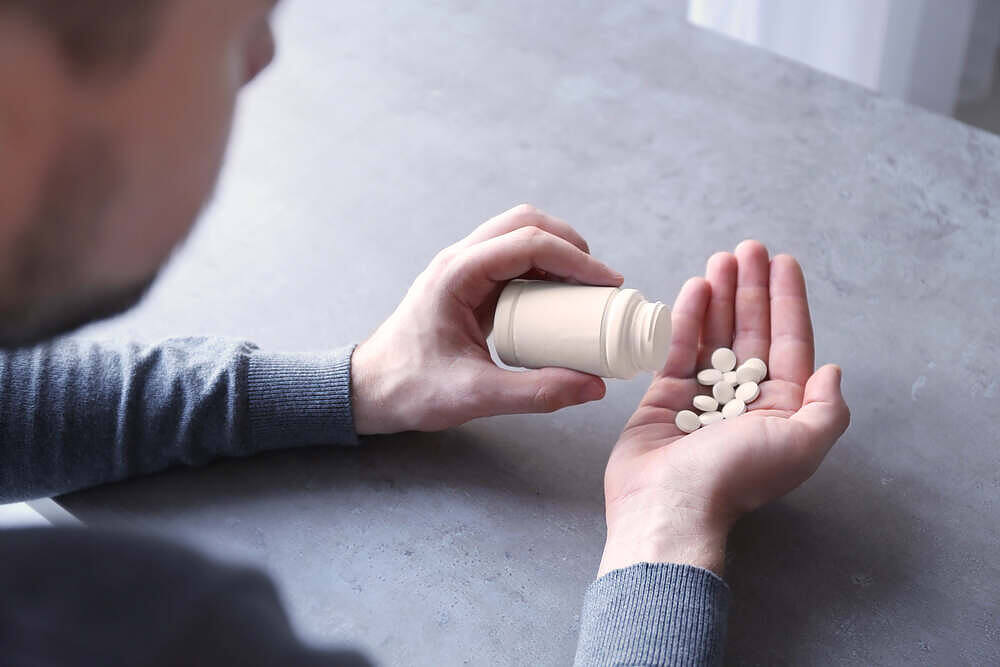
If you are worried that someone you love has an addiction to Mogadon, there are some signs to look out for.
Addiction can be mild, moderate or severe. The more severe the addiction the easier it is to spot.
As addiction progresses they will lose more and more control around their drug use. This will cause them to become increasingly careless and reckless. Consequences will also accumulate and become more severe.
If you are worried a family member or loved one has an addiction to Mogadon, it is best to seek professional help without delay.
By calling one of our friendly addiction treatment experts, we can help guide you and them through the correct treatment process.
Signs of Mogadon addiction include:
- Risk-taking with Mogadon. Abusing the drug or taking risks whilst under the influence
- Hazardous levels of use
- Suffering from social problems due to drug use
- Interpersonal relationships are affected by the use
- Experiencing legal problems as a result of use
- Developing benzodiazepine withdrawal symptoms
- Developing a tolerance to larger and larger doses of Mogadon
- Progressively taking more over time
- Spending larger amounts of time under the influence of Mogadon
- Repeated attempts to quit and control the use
- Experiencing strong cravings for Mogadon
- Loss of control around use. This affects when, where and how much they use
- Giving up activities and hobbies
- Financial difficulties due to purchasing Mogadon or neglecting finances through drug use
Signs of Mogadon abuse include:
- Reduced performance at work or at school
- Finding numerous packets in their possession
- Evidence they are buying from the internet
- Using multiple doctors for multiple prescriptions
- Suffering from mood swings, low motivation and depression
- Loss of interest in the things they used to enjoy
- Have become socially withdrawn and distant from family
- They may disappear for days at a time and don’t answer their door or phone
- Neglecting responsibilities
- Increased risk-taking
- Uncharacteristic or inappropriate behaviour
- Aggressive or violent when intoxicated
- Defensive or dismissive when challenged
- Have become secretive
- Changes in weight and appearance
- Have been taking hazardous amounts of Mogadon, or mixing with alcohol or other drugs
If drug abuse is left untreated it can easily develop into a full-blown addiction. The earlier you intervene the better.
Whilst addiction cannot be cured, it can be prevented and it can be successfully treated.
How long does Mogadon stay in your system?
The half-life of Mogadon is on average 24 hours. Steady-state levels are achieved within five days, meaning that your system will be clear within 5 days of using it just once.
However, it is very difficult to predict how long the drug will stay in your system.
If you have a chronic dependence you may well test positive for Mogadon in your urine for up to a few weeks after detoxification.
Mogadon can be detected in a person’s hair sample for 90 days or more.
Symptoms of a Mogadon overdose
As with most benzodiazepines, overdose occurs when mixing Mogadon with Alcohol or with another CNS depressant
Signs of overdose include:
- Severe drowsiness, hard to wake
- Unresponsive
- Mental confusion
- Slowed respiratory rate and pauses in breathing
- Slowed heart rate
- Hypotension
- Hypothermia
- Weak pulse
- Coma
If you suspect someone has overdosed, time is a crucial factor in their survival. You should place them on their side (in the recovery position) and immediately call for an ambulance.
A trained ambulance responder will guide you through the steps you can take whilst waiting for medical assistance to arrive.
Mogadon treatment and rehab

Thankfully there are a vast number of evidence-based treatments that can help you or a loved one to overcome your addiction.
The latest in advanced addiction treatments are available within our CQC rehab centres and detox clinics, which can be accessed privately or with health insurance.
It is important when undergoing treatment for any addiction that the whole person is treated comprehensively, not just the drug that they have a problem with.
Addiction treatments need to be bespoke and tailored to their individual treatment criteria in order to work. There is no one method of treatment that suits all.
If you do not have the financial means to undergo private addiction treatment, we recommend you contact your local drug and alcohol team for help. You can access free key work sessions and mutual aid support groups such as Narcotics Anonymous and SMART Recovery.
Your physician will also be able to assist you with a tapering off regime.
If on the other hand, you do have the means to go private, there are many benefits in doing so.
Evidence-based treatments that our CQC registered drug rehabs provide include:
- Full medical detoxification for Mogadon and any other substances
- Cutting edge behavioural therapies
- Family therapy and family programmes
- Detox only, or detox and full rehabilitation (duration of the programme varies)
- Around the clock support delivered by a team of multidisciplinary professionals
- Medical and psychological treatment delivered by qualified doctors, psychiatrists, psychologists, counsellors, nurses, therapists and support workers
- A bespoke and comprehensive rehabilitation programme
- Nutrition plan
- Full aftercare programme
- A comprehensive evaluation and treatment for dual diagnosis illness
- Relapse prevention strategies
- Intensive treatment to unearth and heal the root causes of your addiction problems
- Introduction to community-based addiction support groups including 12 step fellowships
- Comprehensive holistic programme
- Complementary treatments
- Anxiety reduction treatments and strategies
- Mindfulness treatments
- Group and individual counselling sessions
- Treatment and support for emotional, social, health, occupational and legal problems
- Assisted reintegration into the community, including sober living houses
Mogadon detox and rehab
If you or a loved one need help to overcome an addiction or an abuse problem, we specialise in bespoke addiction treatment.
We can also provide an inpatient medical detox if you have Mogadon dependence.
Our expert team will devise a uniquely tailored treatment programme consisting of the latest in evidence-based treatments. Addiction can be overcome with the right help and treatment.
Addiction treatment starts with detoxification, intensive rehabilitation, and maintenance treatment to help prevent relapse.
Call us today for a free and confidential assessment of your or your loved ones treatment needs. We will ensure that you access the right rehab programme. The one that meets all of your treatment criteria and heals the whole individual.
Speak to one of our friendly addiction treatment experts for more information. We will be happy to answer any questions you have regarding Mogadon addiction and treatment.
Sources
NICE Guidelines. Nitrazepam. Indications for use.
Nitrazepam. Patient information
What happens when you stop taking benzodiazepines?
Why do drug-addicted persons keep using drugs?
DSM-5 Criteria for Substance Use Disorders: Recommendations and Rationale
Nitrazepam 5mg tablets. Clinical information
Detection of benzodiazepines in human hair by radioimmunoassay
